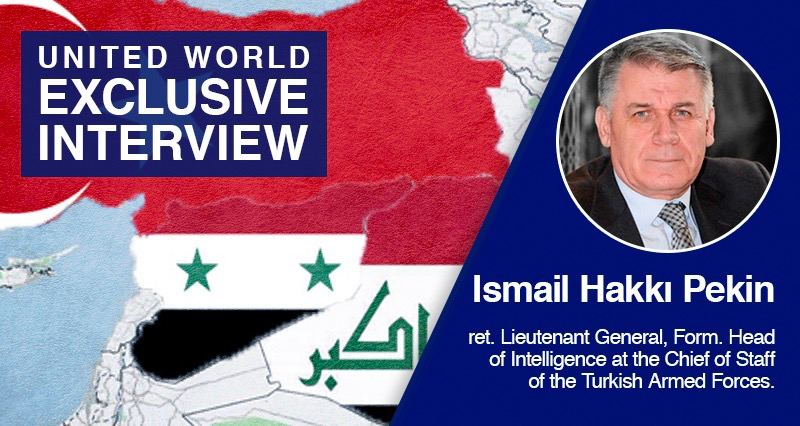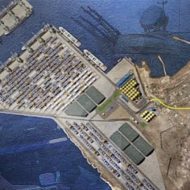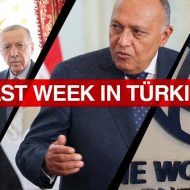Interview by Yunus Soner
On March 14, a very high-level Turkish government delegation visited Bagdad, the capital of Iraq. Foreign Minister Hakan Fidan, Defense Minister Yaşar Güler and İbrahim Kalın, the Chef of National Intelligence met with their Iraqi counterparts.
The visit resulted in a joint declaration. In the text, the Iraqi side – for the first time – determines the PKK as a “threat to security” and an “illegal organization whose presence on Iraqi soil is a violation of Iraq’s constitution”.
Türkiye already maintains a huge number of military bases in northern Iraq, on the territory of the Kurdish Regional Government (KRG). Ankara and Baghdad have now established a joint permanent committee to coordinate the struggle against terror.
Soon after the visit, Lieutenant General Metin Tokel, commander of Türkiye’s Second Army responsible for the region, visited Iraq and convened with authorities from the KRG and the Iraqi central government.
The joint declaration goes well beyond the joint fight against terror. It establishes joint committees for trade, energy, water, health and transportation and announces to advance the work on a bilateral memorandum of understanding that shall provide relations with “an institutional and strategic framework”.
Turkish government representatives and press mentioned frequently the construction of the Route of Development in this context: A railroad and highway connection that departs from the city of Fao, at the Persian Gulf, crosses entire Iraq and reaches Türkiye, from where it’s supposed to continue till the European continent.
We spoke about all these issues with Ismail Hakkı Pekin, retired lieutenant general of the Turkish Armed Forces and former head of Intelligence at the General Staff.
How do you evaluate the fact that both sides agreed to declare the PKK a threat?
According to the declaration, the PKK is not defined as a terror organization but as an illegal organization. I am not sure what that will mean in the practice.
Still, it is important that Iraq signs such a declaration, stating that the PKK is a joint threat. They now need to stand by their signature and do not allow the presence of the organization.
But I do also consider that in this decision of the Iraqi central government, the United States also has played a role. Most probably, they supported the decision. Türkiye has shown some pressure, and they have given in.
As for the Turkish-American relations, I observe a general rapprochement, with Türkiye approving Sweden’s NATO membership, the US providing the F-16.
But then, there is another matter: The US wants to use the Kurds against Iran, or to balance Iran. The West expects certain uprisings in Iran during the summer, they bet on that. And here, they need an actor to counterbalance Iran and Russia too. This can be Türkiye.
But here, Ankara says ‘I’ll do it, but I have my own security issues’. And it seems to me they made a package out of all that.
You consider this a move against Iran within Iraqi politics, then?
They want to counterbalance Iran within Iraq. Firstly, with the Kurdistan Democratic Party of Barzani. That is already on Türkiye’s side. Secondly, pulling the central government on Ankara’s side as well. That will result in a counterbalance against Iran in both Baghdad and Erbil parliaments.
Then we have the Hashdi Shaabi, the militia in the defense ministry. They also took part in the recent meetings. Then comes the Patriotic Union of Kurdistan, led by Bafel Talabani. Talabani has certain demands from Türkiye, such as recognition and an official meeting with Hakan Fidan.
If the US pulls out its troops from Iraq, there will be a vacuum that Iran will fill.
Coming back to the fight against the PKK. Turkish government officials stated that the crossing from Iraq to Syria will be cut off.
Of course. You see, to for the Turkish military operation in Iraq, you need a lot of soldiers and check points there. Now, Türkiye is taking care of that with support of Iraq.
And here, also within the concept of the Route of Development, the area around Mosul and Sincar needs to be secured. Türkiye will of course control Sincar, which is the crossing point to Syria. The cross-overs from Iraq to Syria must be stopped.
But I hope that the US does not force us to complete its own tasks.
What do you mean?
We have to be careful. They have not given the F-16 for nothing. Maybe we see the consequences, after the local elections of 31st of March in Türkiye. It seems we are heading to a new round of the so-called opening process (negotiations between the government and PKK-dominated political actors on constitutional reform of Türkiye, UWI). Then, they will support this opening with such operations.
The Syrian National Army for instance, which is supposed to be under Turkish control, is dominated by American intelligence. The US wants to place the PYD (PKK’s Syrian arm, UWI) under the command of Assad. That would give them an official status.
Some argue that Türkiye might push the PKK in Syria further south and in exchange accept the establishment of a Kurdish autonomous region in the east of the Euphrates under Ankara’s protection. Do you consider this possible?
That is quite possible. The US does not really inform Türkiye about its plans. We do not know whether they have a back-channel agreement there. Türkiye wants to avoid that the PKK controls a territory and has an armed force, such as the SDF. Ankara wants the SDF to be dissolved.
Returning to Iraq. You see a confrontation with Iran?
The United States wants to use Türkiye in the region. It wants Ankara to ensure regional stability and counterbalance Russia and Iran.
The Development Route needs to be secured. That project needs 5–6 years to be completed. The deal might be that Türkiye secures the path, while eliminating the PKK.
But that project is not new. It was planned in 2005 already. And it’s questionable whether the US accepts a transfer of for instance oil from Basra via Türkiye to Europe, when it can also transfer it via Israel to the Mediterranean. Besides, via a route where Russia and Iran can easily intervene too. I have my doubts on that project.
But generally speaking, I think this agreement between Türkiye and Iraq needs to be evaluated in the context of the war in Ukraine and in Gaza.









Leave a Reply